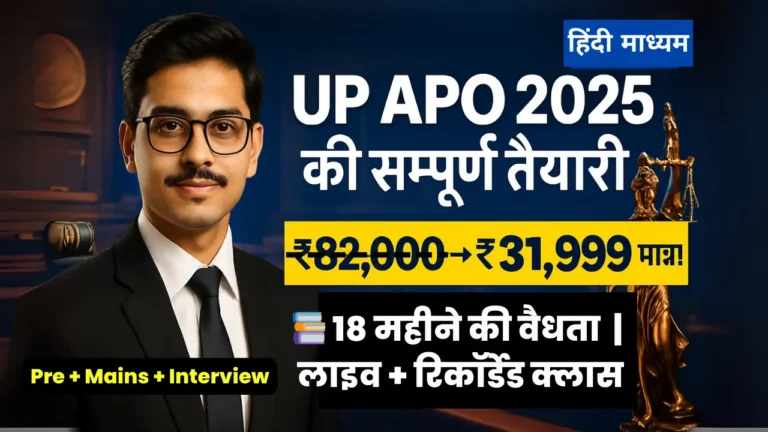Justice Surya Kant, recently appointed as the Executive Chairman of NALSA in May 2025, has had a remarkable legal career spanning over four decades. From his humble beginnings in Hisar to becoming a Supreme Court judge and now leading NALSA, explore his life, key judgments, and contributions to India’s justice system. A must-read for UPSC 2025 aspirants and law enthusiasts!
Table of Contents
Introduction: Justice Surya Kant’s Ascension to NALSA Chairman
On May 14, 2025, Justice Surya Kant, one of India’s most respected jurists, was appointed as the Executive Chairman of the National Legal Services Authority (NALSA) by President Droupadi Murmu. This appointment came as Justice B.R. Gavai, the previous NALSA Chairman, assumed the role of the 52nd Chief Justice of India on the same day, following the retirement of CJI Sanjiv Khanna on May 13, 2025. As per convention, the second senior-most judge of the Supreme Court takes on the role of NALSA Chairman, and Justice Surya Kant, being the senior-most after CJI Gavai, was the natural successor.
Justice Surya Kant’s journey from a small town in Haryana to the apex court and now to the helm of NALSA is a testament to his dedication, legal acumen, and commitment to justice. For UPSC 2025 aspirants, law students, and legal professionals, understanding his life, career, and landmark judgments offers valuable insights into India’s judicial system and the role of NALSA in ensuring access to justice for all.
Life Profile: From Humble Beginnings to the Apex Court
Justice Surya Kant was born on February 10, 1962, in Petwar village, Hisar district, Haryana, into a middle-class family. His early life was marked by modest circumstances, but his determination and academic excellence paved the way for a stellar legal career.
- Education:
- Graduated from Government Post Graduate College, Hisar, in 1981.
- Earned his Bachelor of Laws (LL.B.) from Maharishi Dayanand University, Rohtak, in 1984.
- Later pursued a Master’s degree in Law (LL.M.) through the Directorate of Distance Education, Kurukshetra University, where he stood First Class First in 2011—a rare achievement for a practicing lawyer and judge.
- Personal Milestones:
Justice Surya Kant’s academic journey reflects his commitment to continuous learning, even amidst a demanding legal career. His roots in Haryana instilled in him a deep understanding of the challenges faced by marginalized communities, a perspective that would later shape his judicial philosophy.
Legal Career: A Trailblazing Path
Justice Surya Kant’s legal career spans over four decades, marked by significant milestones that highlight his expertise, leadership, and dedication to justice.
Early Career and Advocacy (1984-2000)
- Starting Out: Justice Surya Kant began his legal practice in 1984 at the District Court in Hisar, focusing on grassroots legal issues.
- Shift to Chandigarh: In 1985, he moved to Chandigarh to practice at the Punjab and Haryana High Court, where he specialized in constitutional, service, and civil matters.
- Notable Representations: He represented universities, boards, corporations, banks, and even the Punjab and Haryana High Court itself, showcasing his versatility and legal prowess.
Advocate General of Haryana (2000-2004)
- In July 2000, at the age of 38, Justice Surya Kant was appointed as the Advocate General of Haryana, earning the distinction of being the youngest person to hold this position.
- In March 2001, he was designated as a Senior Advocate, further cementing his reputation as a leading legal mind.
Judicial Career (2004-2019)
- Judge of Punjab and Haryana High Court (2004): Justice Surya Kant was elevated as a permanent judge of the Punjab and Haryana High Court on January 9, 2004. During his tenure, he also served as a member of the Governing Body of the National Legal Services Authority (NALSA) from 2007 to 2011, gaining early exposure to legal aid initiatives.
- Chief Justice of Himachal Pradesh High Court (2018): On October 5, 2018, he assumed the role of Chief Justice of the Himachal Pradesh High Court. His appointment was not without controversy, as Justice A.K. Goel, a consultee judge, had reservations. However, the Supreme Court Collegium, led by CJI Ranjan Gogoi, upheld the appointment.
- Elevation to Supreme Court (2019): On May 24, 2019, Justice Surya Kant was elevated to the Supreme Court of India, joining the apex court at a relatively young age, ensuring a long tenure.
Supreme Court Tenure and Leadership Roles (2019-2025)
- Chairman of Supreme Court Legal Services Committee (SCLSC): Justice Surya Kant was appointed as the Chairman of the SCLSC on November 12, 2024, succeeding Justice B.R. Gavai, who had moved to the role of NALSA Executive Chairman.
- Executive Chairman of NALSA (2025): On May 14, 2025, Justice Surya Kant was nominated by President Droupadi Murmu as the Executive Chairman of NALSA, a role he assumed following Justice Gavai’s elevation to CJI. As NALSA Chairman, he is tasked with leading efforts to provide free legal aid to marginalized and economically weaker sections, aligning with the constitutional mandate of Article 39-A (equal justice and free legal aid).
Future Prospects:
Justice Surya Kant is slated to become the 53rd Chief Justice of India on November 24, 2025, following the retirement of CJI B.R. Gavai on November 23, 2025. If appointed, he will serve as CJI until his retirement on February 9, 2027, giving him a tenure of over a year to shape India’s judicial landscape.
Important Judgments: A Legacy of Justice and Reform
Justice Surya Kant has delivered numerous landmark judgments that reflect his commitment to constitutional values, human rights, and judicial reform. Below are some of his most significant rulings:
1. S.G. Vombatkere v. Union of India (2022)
- Issue: This case challenged the validity of Section 124A of the Indian Penal Code (sedition) on grounds that it violated Articles 19(1)(a) (free speech), 14 (equality), and 21 (life and liberty).
- Ruling: Justice Surya Kant, as part of the bench, played a key role in directing that all proceedings under Section 124A be kept in abeyance, effectively pausing sedition cases until the law’s constitutionality was re-evaluated. This decision underscored the need to balance national security with free speech, a critical issue for UPSC aspirants studying constitutional law.
2. Union of India v. Tarsem Singh (2025)
- Issue: This appeal sought clarification on the prospective application of a prior ruling regarding solatium and interest in land acquisition cases.
- Ruling: Justice Surya Kant, alongside Justice Ujjal Bhuyan, reaffirmed the beneficial nature of granting solatium and interest in compensation cases, emphasizing fairness in land acquisition proceedings. The judgment highlighted the importance of avoiding unjust classifications, showcasing his nuanced approach to administrative law.
3. Ajay Malik v. State of Uttarakhand (2025)
- Issue: A woman from a Scheduled Tribe in Chhattisgarh was trafficked to Delhi under false promises, subjected to abuse, and denied wages as a domestic worker.
- Ruling: While the criminal proceedings were quashed, Justice Surya Kant called for urgent legislative and executive action to protect domestic workers, particularly those from marginalized communities like Scheduled Castes, Tribes, and Economically Weaker Sections. This judgment reflects his sensitivity to social justice and the exploitation of vulnerable groups.
4. Jitendra Singh v. Ministry of Environment and Ors. (Undated, Pre-2025)
- Issue: This case addressed the environmental impact of schemes that extinguish local water bodies.
- Ruling: Justice Surya Kant held that such schemes violate Article 21 (right to life), as water bodies are public utilities meant for common use. This judgment underscores his commitment to environmental justice, a growing area of concern in constitutional law.
5. Jasvir Singh Judgment (Punjab and Haryana High Court Tenure)
- Issue: Focused on prison reforms and the rights of inmates.
- Ruling: Justice Surya Kant directed the State of Punjab to form a Jail Reforms Committee to enable conjugal and family visits for inmates, emphasizing the reformatory goals of such measures. This progressive ruling highlights his focus on human rights and prison reform, themes often discussed in UPSC mains essays.
6. Mariam Fasihuddin & Anr. v. State by Adugodi Police Station & Anr. (2024)
- Issue: A case involving allegations of cheating under Section 420 of the IPC.
- Ruling: Justice Surya Kant clarified that to attract Section 420, the prosecution must prove both cheating and dishonest inducement to deliver property. This judgment refined the legal interpretation of cheating offenses, providing clarity for criminal law practitioners.
7. Arvind Kumar Pandey v. Girish Pandey (2024)
- Issue: A motor accident claim involving a 50-year-old homemaker.
- Ruling: Justice Surya Kant held that a homemaker’s role is as valuable as any income-earning family member, and her notional income should not be less than a daily wager’s under the Minimum Wages Act. This progressive ruling on gender justice ensures fair compensation for homemakers, a significant step toward recognizing unpaid labor.
Role as NALSA Executive Chairman: Advancing Access to Justice
As the Executive Chairman of NALSA, Justice Surya Kant is tasked with ensuring that free and accessible legal aid reaches all citizens, particularly those from marginalized and economically weaker sections. His appointment on May 14, 2025, aligns with NALSA’s mission under Article 39-A to ensure that justice is not denied due to financial or social constraints.
Key Responsibilities:
- Legal Aid Expansion: Overseeing initiatives like National Lok Adalats, which recently settled over 1.57 crore cases worth ₹5,473 crore in 2025.
- Focus on the Marginalized: Strengthening legal aid for undertrials, women, Scheduled Castes/Tribes, and economically disadvantaged groups.
- Institutional Reforms: Building on his prior role as SCLSC Chairman, Justice Surya Kant is expected to advocate for systemic reforms, such as leveraging technology for legal awareness and case management.
Expected Impact:
Given his prior involvement with NALSA (as a Governing Body member from 2007-2011) and his judicial focus on social justice, Justice Surya Kant is likely to prioritize:
- Enhancing legal literacy in rural areas.
- Reducing pendency in legal aid cases through alternative dispute resolution mechanisms like mediation.
- Addressing systemic issues like the release of elderly and terminally ill convicts, a cause NALSA has recently taken up.
Why Justice Surya Kant Matters for UPSC 2025 Aspirants
- Prelims: Know key facts—Justice Surya Kant’s appointment as NALSA Chairman (May 14, 2025), his potential as the 53rd CJI (November 2025), and Article 39-A (free legal aid).
- Mains: Write essays on:
- “Role of NALSA in ensuring access to justice: Challenges and opportunities.”
- “Judicial reforms and social justice: Lessons from Justice Surya Kant’s career.”
- Interviews: Discuss his judgments on sedition, environmental justice, and domestic workers’ rights to showcase your understanding of constitutional law and social issues.
Conclusion: A Jurist Committed to Justice for All
Justice Surya Kant’s journey from Hisar to the Supreme Court and now to the leadership of NALSA is an inspiring story of perseverance, legal brilliance, and a deep commitment to justice. His landmark judgments on sedition, environmental protection, gender justice, and prison reforms reflect a judicial philosophy rooted in constitutional values and social equity. As the Executive Chairman of NALSA, he is poised to make significant strides in ensuring that justice is accessible to every citizen, particularly the most vulnerable. For UPSC 2025 aspirants and law students, Justice Surya Kant’s career offers a wealth of lessons on law, governance, and the transformative power of the judiciary.
Call-to-Action
Prepare for UPSC 2025 with our expert courses on constitutional law and current affairs at https://doonlawmentor.com/courses! Follow @doonlawmentor on Instagram for daily updates! #JusticeSuryaKant #NALSA2025
FAQs for Exam Prep
- Who is Justice Surya Kant?
A Supreme Court judge appointed as NALSA Executive Chairman on May 14, 2025, and slated to become the 53rd CJI in November 2025. - What are some of Justice Surya Kant’s key judgments?
Notable rulings include S.G. Vombatkere v. Union of India (sedition), Ajay Malik v. State of Uttarakhand (domestic workers’ rights), and Jitendra Singh v. Ministry of Environment (environmental justice). - What is NALSA, and what is Justice Surya Kant’s role?
NALSA provides free legal aid to marginalized sections under Article 39-A. As Executive Chairman, Justice Surya Kant leads these efforts, focusing on legal aid and judicial reforms. - Why is Justice Surya Kant’s career relevant for UPSC 2025?
His judgments and role in NALSA touch on key UPSC topics like constitutional law, judicial reforms, and social justice, making him a critical figure to study.
#Doonlawmentor #JusticeSuryaKant #SupremeCourtIndia #NALSA #NALSAChairman #nextcji #chiefjusticeofindia #JudiciaryAspirants #UPSC2025 #CLAT2025 #53rdcji #maharshidayananduniversity #mdullb #kurukshetrauniversity






